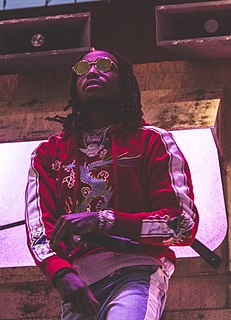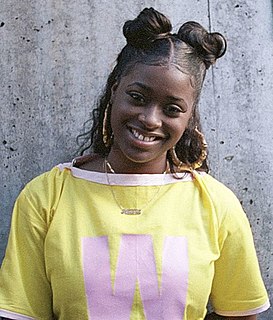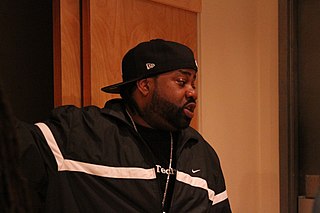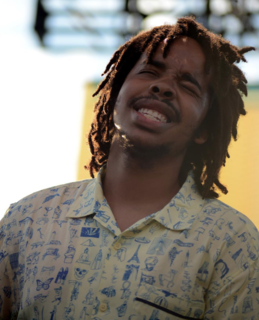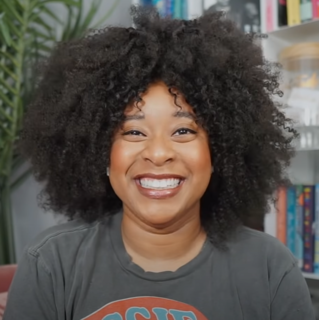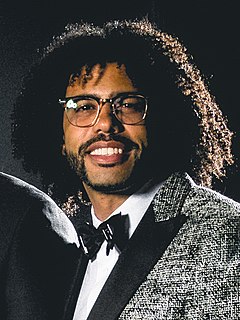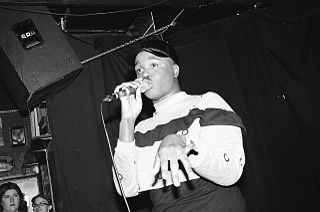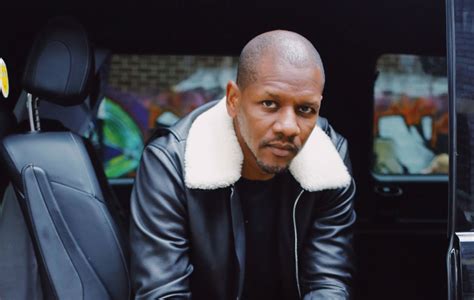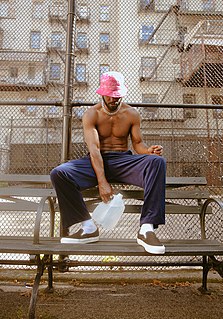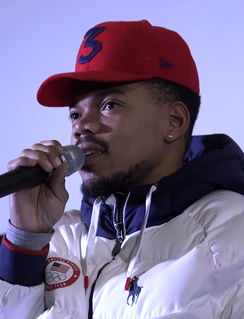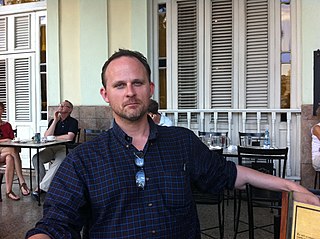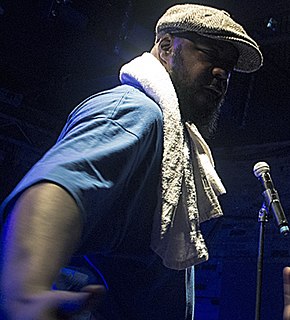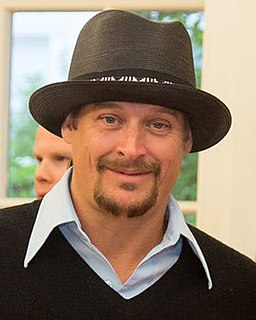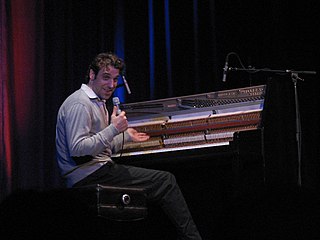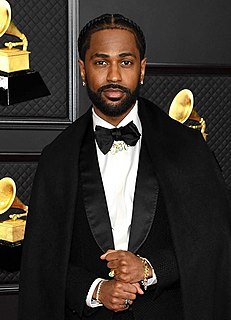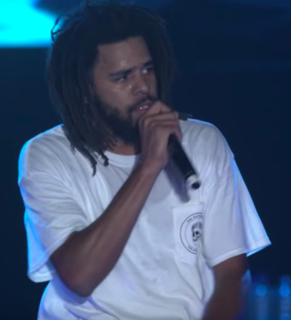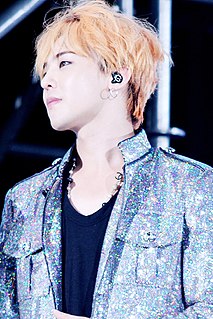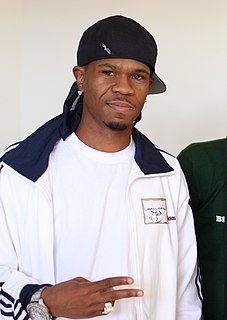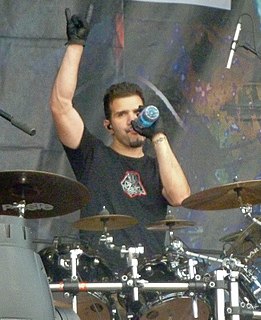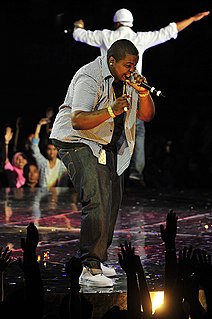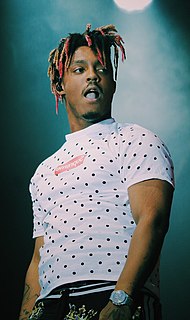Top 1200 Rap Quotes & Sayings - Page 3
Explore popular Rap quotes.
Last updated on December 22, 2024.
We used to have MTV and all these ways we can show our videos, and it was these rap shows, and it was everything. And then it became not cool to be conscious; it became cool to just hang out. Escapism rap became the norm. And, when I say "escapism rap", I mean getting high, get your cars, get your money, get your jewelry, go to the club, have your women, and it just became all about escaping your reality and not making your reality better on a real tip; not just on the have fun tip.
What's when you rap and don't appreciate the art?
What's when you sell out just to get a start?
What's when you make bullshit just for the charts?
What's when you rap, but it's not from the heart?
What's when you're hardcore, then you turn pop?
When you steal ideas to get props?
When you sell out to be on top?
What's when you front like you're hard, but you're not?
That's a gimmick.
They thought we were just basically keeping ourselves underground on purpose. And it was just strange for people to approach music that way. And for rap, trying to get recognition, and be seen as a regular form of music like anything else. I mean, the Soul, R&B, Rock 'N Roll, they would dis the hell out of rap when it first came out.
I think that a rap aficionado, the hardcore rap fan, will always go away from pop, in the same way a hardcore jazz fan will never think Kenny G is really a jazz artist. You gotta kind of know there's always going to be that purist who's going to be like if it ain't beats and rhymes, if there ain't a DJ, then that ain't Hip Hop.
Gangsta rap often reaches higher than its ugliest, lowest common denominator, misogyny, violence, materialism and sexual transgression are not its exclusive domain. At its best, this music draws attention to complex dimensions of ghetto life ignored by most Americans. Indeed, gangsta rap's in-your-face style may do more to force America to confront crucial social problems than a million sermons or political speeches.
We thought that using rap would draw a parallel with the protest music from the 60s and 70s that we found through the research for animadoc. When we thought about rap, Emicida immediately came to mind and we decided to call him to create this song bring the audience back to earth and put their feet on the ground. Emicida's song is the only one that has lyrics in actual understandable Portuguese.
Public Enemy started out as a benchmark in rap music in the mid-1980s. We felt there was a need to actually progress the music and say something because we were slightly older than the demographic of rap artists at the time. It was a time of heightened rightwing politics, so the climate dictated the direction of the group.
I think rap music is rap music. I mean, are there heavy writing aspects of it? Absolutely. In a sense, is it poetry? Yeah. I've heard that so much, growing up in a house with poetry. But I think people like to use that as a shortcut for who's good and who's not. It's like the word 'lyrical' - 'lyrical' is the worst word in the entire world.
You can't expect to be on MTV and critique George Bush. You can't expect to be on BET or the cover of 'The Source' advocating Jesus Christ or Buddha or Hindu Krishna or Moses. As a conscious rap artist, you have to play in the arena that you're supposed to be in. What is that arena? That arena is the college market. The conscious rap artist woos the college market, even though the college market is the wildest, most sexed-out, drug-driven market in the country, possibly the world.
I do think there's a great deal of politics mixed in rap. Their reference to the real world is much better than most, particularly a lot of women who seem like all they do is sing about love. Love is such a fleeting emotion. It's such a small part of the things you do in your life. I don't understand why that's all they concentrate on, except that that's what they're encouraged to do, because if you keep thinking about love, you'll be less of a challenge. I like that about rap. It's got power to it.
I like to consider myself a student of hip hop. There's a certain level of certification and wit and craftsmanship that comes with rapping. As rap progresses - it's a young genre - it's becoming way more mainstream, crossing over to different lanes. I feel like it's losing its essence in a way, because it's getting commercialised. I want to keep it fresh and keep it progressive, but I also want to respect the foundation of what rap is about.
Rap music and rap records used to always be like this: we get one or two shots to a piece cause it was a singles marketplace and when the major record companies saw that it could also handle the sales of the albums then they started to force everybody to expand their topics from 1 to about 10 and you gotta deliver 12 songs, so a lot of times if you took a person who wasn't really developed, and the diversity of trying say 12 different things, you know the companies were like "Cool! Say the same thing 12 different ways."
It really really sunk into me when I went to Europe and they take rap so much more serious than we do here. That was the first time I ever heard rap considered folk music. And sometimes somebody will make you understand like, "Hey, what you doin' is serious, don't play it lightly 'cause it's changin' my life."
The weird thing about rap is that you don't get compared in the same way that athletes do, even though it's probably the most competitive sport in music. In basketball, they look at a player and say: 'This guy was the best in his prime at this sport.' But in rap it's not until you're dead or retired that people think about it like that.
To have so many years in the rap industry and so many number one songs, and sold so many millions of records, introduced the world to people like Cool & Dre, DJ Khaled, Pitbull, Rick Ross, Trick Daddy, Remy Ma, Big Pun, Rico Love... I could go on and on. Having been able to influence the rap game for so long is very important to me.
The hip-hop that I really connected with was Public Enemy, KRS-One, Ice Cube, and N.W.A. That late '80s and early '90s era. The beginning of gangster rap and the beginning of politically conscious rap. I had a very immature, adolescent feeling of, "Wow, I can really connect with these people through the stories they're telling in this music."
I've just really been into melody and lyrics and songwriting. Writing a rap, to me, is easy. I could write a rap like that. But writing songs and melodies and s**t that's hopefully going to stick around for 30, 40 years is f**king hard...If you have good songs and you're talented, people will eventually come to your shows, people will buy your music.
I mean, there's an aspect I've always said that is - it's, you know, it's not poetry but it's kind of like it. It's not song lyrics but it's kind of like song lyrics. It's not rap but it's kind of like rap. And it's not stand-up comedy but it is kind of like stand-up comedy. It's all those things together.
I think, a lot of times, the mistake in music - even rappers that are trying to be big time - if you're broke, rap about being broke. If you're sensitive, rap about being sensitive, 'cause there are other sensitive people. If you're sensitive, but you talk about being a tough person that doesn't care about anything, people will call your bluff.
If I were to critique myself - step out of KRS objectively and look at him - I would say that KRS has introduced the concept of being hip-hop, not just doing it. The concept of rap as something we do, while hip-hop is something we live. The concept of living a culture. Don't just look at hip-hop as rap music, see it as a culture.
If you're going to point out the ridiculousness of a rule, it's naïve to think that you can break it. It's the same way that rappers have embraced capitalism. Some people say they liked it better when rap was a literal protest form in the '90s. But I think it's more a form of protest today, because it's telling the story of what happens once something forbidden is within reach. I think rap is more political today when it speaks about luxury watches than it does about fighting the power.
Rap is the only super-current music. If you're into reggae or dancehall, and you don't know Bob Marley, then you don't really know what you're listening to. But if you're listening to rap, and you're 15, you're like, 'Grandmaster Flash? Who's that? Public Enemy? Yeah, my dad told me about them once.' And that's just how it is.
You can't write a book if you've never read a book. And if you've read five books and you try to write a book, your book will mainly encompass the themes and the context of the five books you've read. Now, the more books you read, the more you can bring to a book when you decide to write one. So the more rap I learned, the more I was able to bring to rap when I decided to rap. But this was all subconscious.
In my mind, New York was the place where they had the underground rap shows and I could get in on some ciphers and just rap. This whole fantasy world I had created in my head about New York just from listening to the music my whole life, like, I'ma go up there and do that. But when I came up here, there was none of that, that scene was dead.
Coming into this, making music, I knew that was something that was going to be held over my head. Okay we get it, you're openly gay, but do you know how to rap? Can you really rap and deliver? And I feel like I have that pressure put on me that other artists don't. A lot of people don't have to focus on being so lyrical and actually putting on shows. Before anyone was gonna tell me I was bad, I was gonna prove that I was good.
We've always said we're a HEAVY METAL band. We've kinda branched out here and there - we've done a rap thing, we've done a rap-rock thing, we've done something with Angelo Belmonte, who's the primary composer of Twin Peaks. In fact, most of David Lynch's movies is Angelo. He did something with us and that was great. We've also acted, we've done an episode in Married with Children, which was awesome - so we're always looking to do things which you wouldn't expect.
In this time, we incorporate money and media, and it's split up like apartheid, where when you say "hip-hop," you think just rap records. People might have forgot about all the other elements in hip-hop. Now we're back out there again, trying to get people back to the fifth element, the knowledge. To know to respect the whole culture, especially to you radio stations that claim to be hip-hop and you're not, because if you was a hip-hop radio station, why do you just play one aspect of hip-hop and rap, which is gangsta rap?
My mom, she got taken away from me when I was 14 years old. She is incarcerated. My sister was incarcerated. I was homeless. When my mom went away when I was 14... I was forced to live with my aunt. My aunt, she doesn't like rap music. She thinks rap music is the devil's music. Basically she said, "Yo, if you are going to do music you can't do it in my house."

